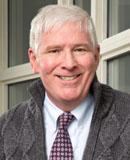
Videos
Digging into crime data to inform news coverage across beats
Reports & Papers
Media Business Models, Media Creation, Media Standards & Practices

A new paper by Steve Oney, author of And the Dead Shall Rise, tells the story of the creation of National Public Radio, and how its philosophy was shaped in its early days, with a unique focus on content quality over broadcasting techniques. The paper is an excerpt of a forthcoming book to be published by Simon & Schuster.
 Steve Oney
Steve OneyJoan Shorenstein Fellow, Spring 2014
Author, And the Dead Shall Rise
Read the full paper (PDF).
Read the paper on Medium.
Hulking and unkempt, typically clad in denim and shit-kickers, Jeff Kamen was referred to around the offices of National Public Radio as El Lobo. He came from the world of big-market rock ‘n roll news. During the late sixties at Chicago’s WCFL, a 50,000-watter that blasted music across the Midwest, he’d race to crime scenes and press conferences in an Olds Cutlass, the doors bearing the station call letters in green, purple, red, and gold. His idea was to be out among them, and his aim was to produce pieces that emerged seamlessly from WCFL’s play list. To him, stories weren’t all that different from Buffalo Springfield or Rolling Stones songs. Everything he did was antic and driven by a beat, and while he numbered both cops and Black Panthers among his friends, he’d take on anyone. “He would talk back to Mayor Richard J. Daley,” said Jeff Rosenberg, a fellow member of NPR’s original staff who as a Northwestern student had been a fan of the reporter. “Most of us thought he would end up dead in an alley.” Instead, WCFL fired Kamen. He did not leave quietly, telling The Chicago American that the station’s manager accused him of putting too many “spics and niggers” on the air. Liberal Illinois congressman Abner Mikva quoted Kamen to this effect in The Congressional Record, declaring, “Last week a bright young radio newscaster lost his job in Chicago—not because he was faithless to the traditions of integrity, rather because he took them seriously.” On the morning of May 3, 1971, Kamen, the most improbable participant in an improbable new enterprise in American broadcasting, stood at the intersection of the Southwest Freeway and Maine Avenue near Washington, D.C.’s Tidal Basin, ready to go to work. Weeks earlier, NPR executives had picked this Monday to introduce their firstborn, All Things Considered. “I felt sorry for the poor bastards,” Kamen would say later. “They put a pin in a calendar, not having any idea.” But there was no turning back. The ad in The New York Times was unambiguous: “The radio revolution starts at 5: NPR.”
Read the full paper (PDF).

Videos

Commentary

Commentary